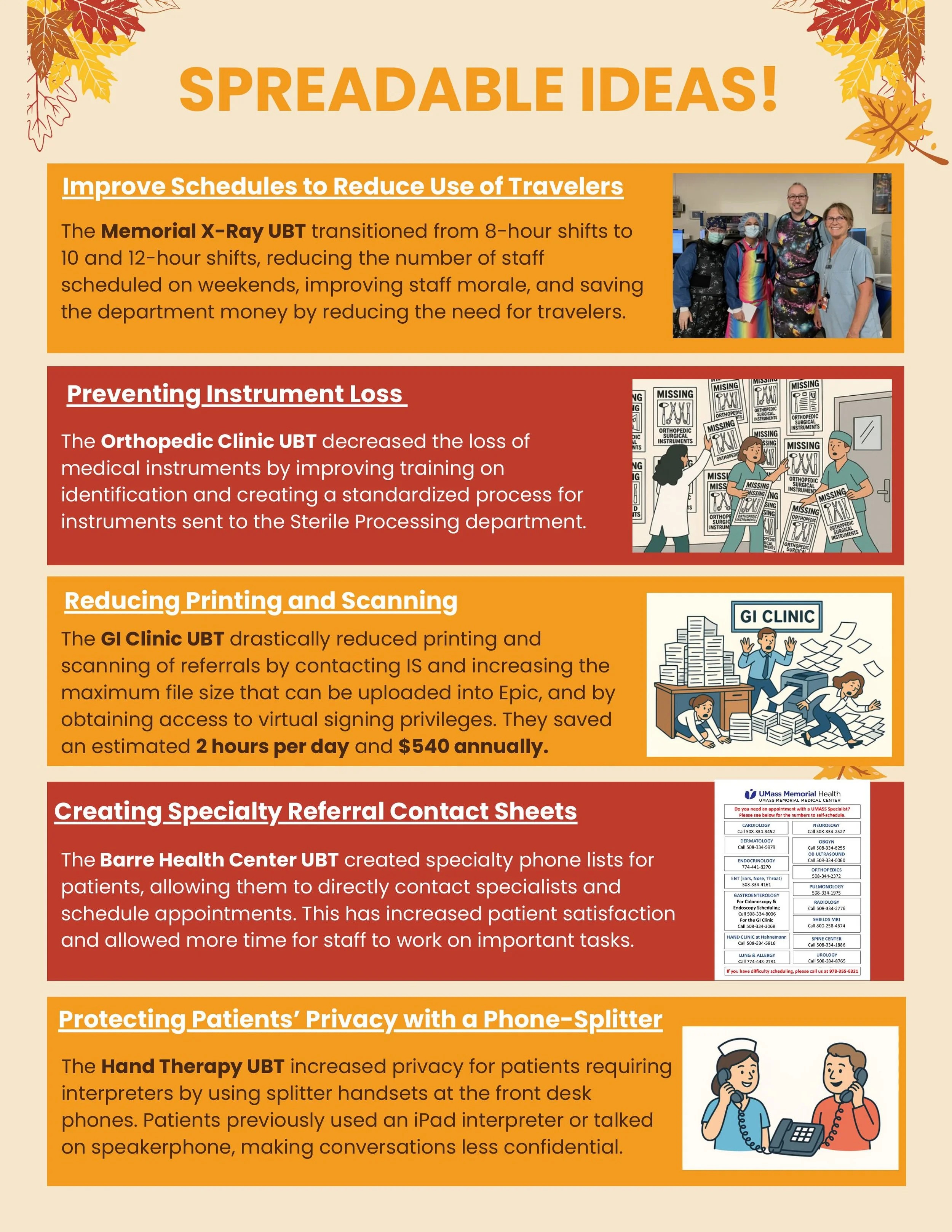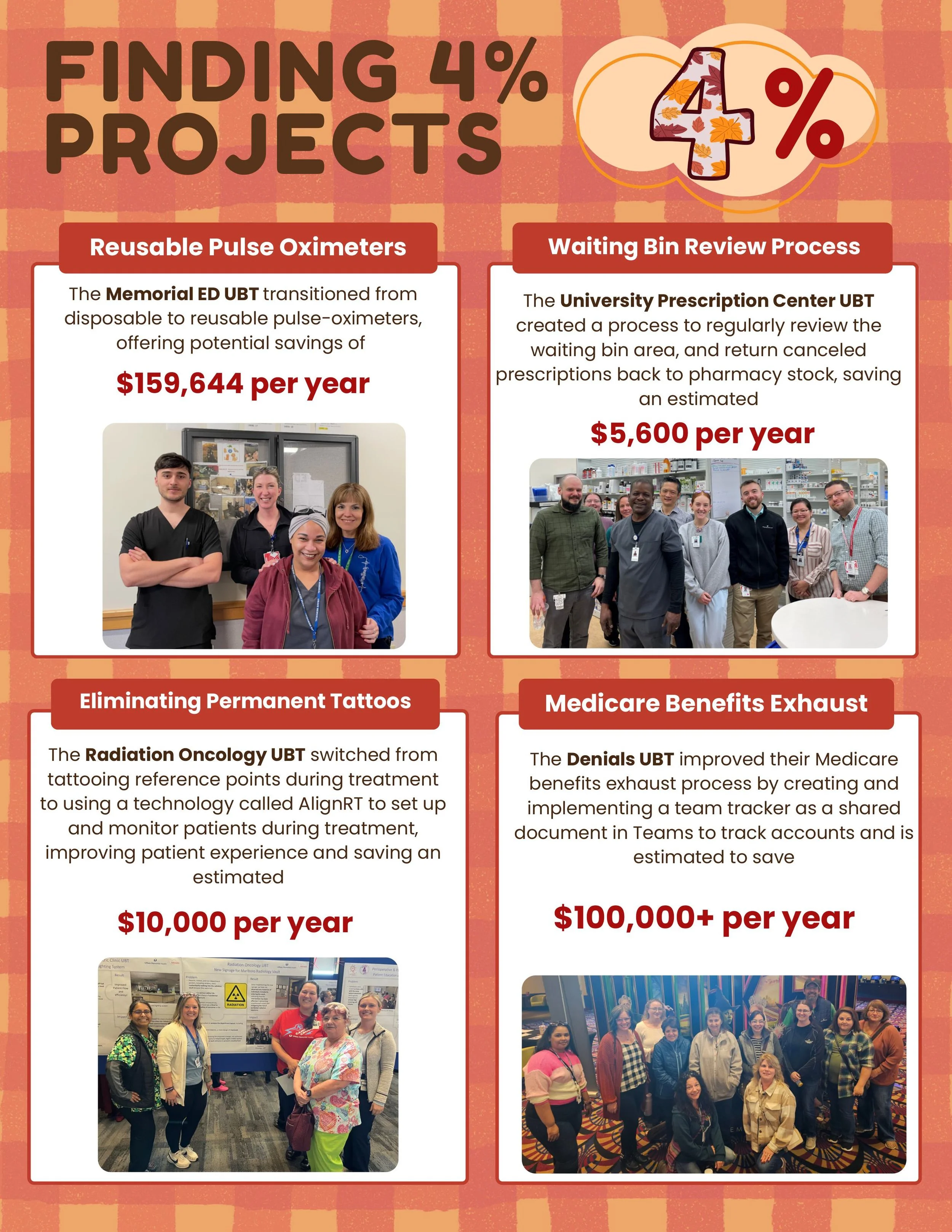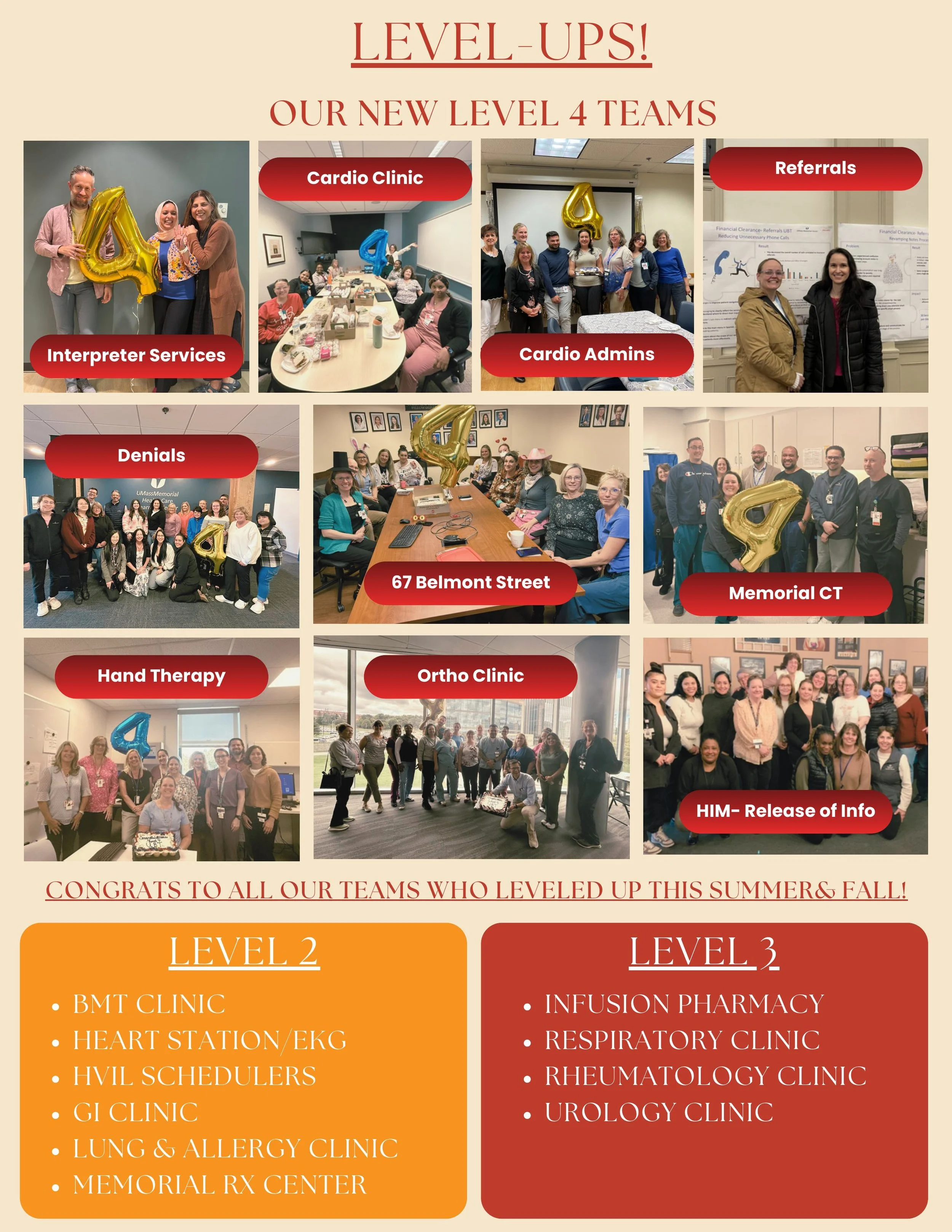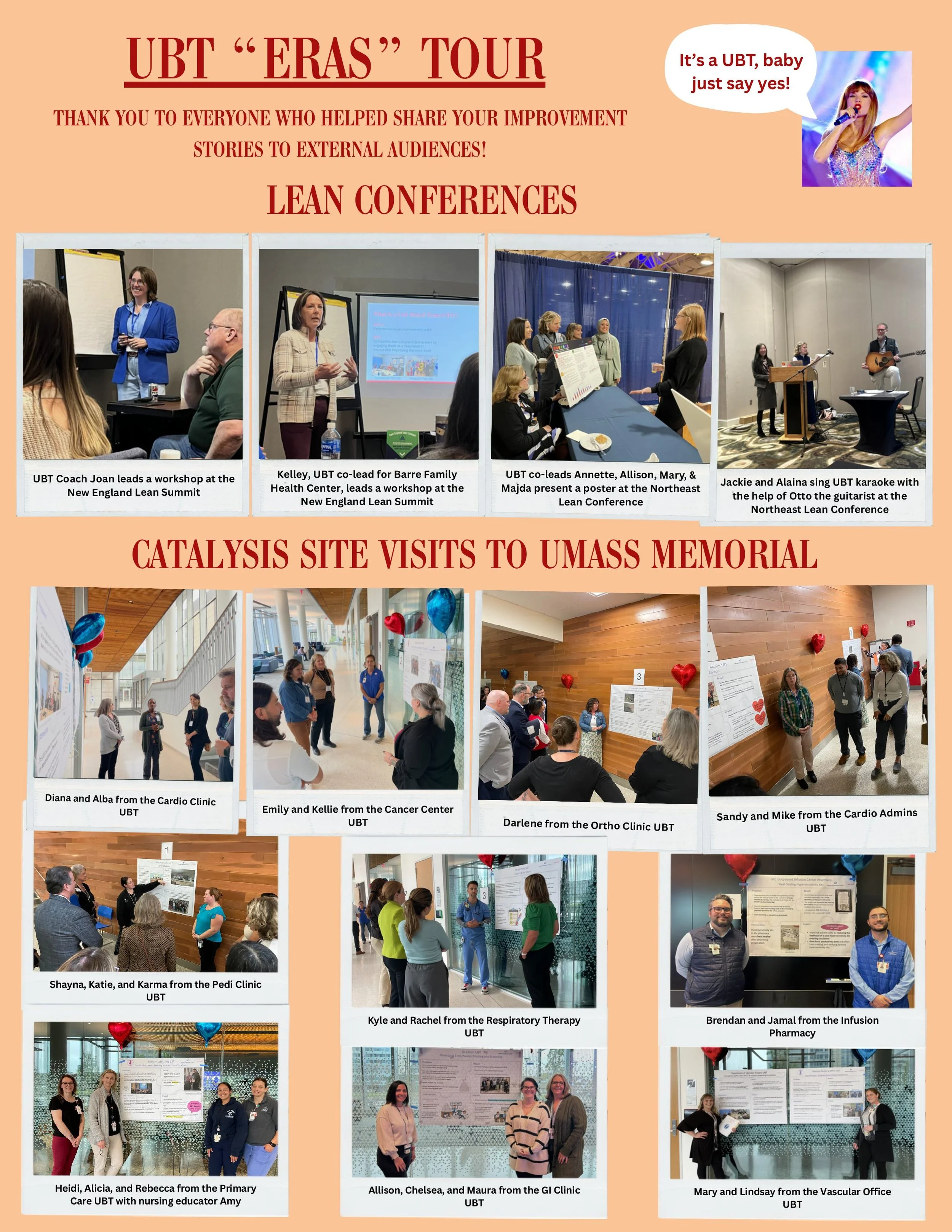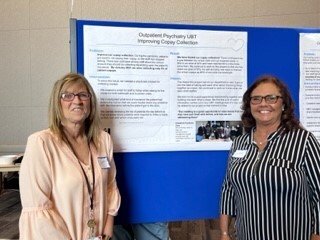From the Partnership Office: 2025 SHARE UBT Fair Highlights
Unit Based Teams Newsletter, Winter 2025
SHARE UBTs Celebrate Reaching Top Level of Path to Performance
UMass Memorial Health and SHARE leaders recently celebrated an impressive milestone reached by two Unit-Based Teams, or UBTs. A UBT is a frontline-led, department-level improvement system that enables caregivers to work on the process problems that make it hardest for them to feel proud of the care they deliver.
This week, Dr. Eric Dickson and other hospital leaders visited the Vascular Surgery Office and Diabetes/Endocrinology departments to celebrate the teams becoming the first UBTs to reach Level 5 status on the UBT Path to Performance.
While over 75 UBTs have been launched over the last several years across the Medical Center, Medical Group, Revenue Cycle, and Marlborough Hospital, these are the first to have reached this top level of performance.
In order to progress through the Path to Performance, a team, made up of a voluntary group of employees consisting of managers, union organizers, and frontline staff, must demonstrate competence in various ways, with a focus on designing and completing improvement projects in their own department. UBT projects often tackle things such as communication or workflow. The ultimate goal of the UBT is to make their departments better places to work — more enjoyable, smoother running, and easier places to give the high-level patient care that they want to provide.
In addition to delivering to each team a traditional SHARE-UMass Partnership Office award — a balloon shaped like a number “5” — Dr. Dickson heard from caregivers about which UBT projects have meant the most to them, what they are working on now, and how having a UBT has changed how they feel about coming to work.
Congratulations Vascular Surgery Office and Diabetes/Endocrinology UBTs for leading the pack!
Click here to learn more about UBTs, and to find out more about how to launch one in your department reach out to Will.Erickson@umassmemorial.org.
SHARE Updates: PCA Pathway Program, Free English Classes, and Unit Based Teams
PCA Pathway Program Now Accepting Applications
Congratulations to the first graduating cohort of the PCA Pathway Program! They’re now on-the-job as SHARE members, caring for patients at UMass Memorial.
Do you know someone who wants to begin a career at UMass Memorial working on the nursing floors? The Patient Care Associate Program is now open to friends and family of SHARE members!
A Strong Summer for Unit Based Teams
First, the bittersweet news: after helping establish the SHARE-UMass Memorial Partnership Office over the past few years, our beloved UBT Program Coordinator, Stephanie Pepi, has accepted another job at UMass Memorial. We wish you the best in Ophthamology, Steph!
There was nothing bittersweet about the recent FMCS/LERA conference in NYC, where leaders from SHARE and UMass Memorial presented to an international audience about the importance of UBTs.
U.S. Secretary of Labor Julie Su (above, middle left) even pulled the presenters into a meeting to talk about the Labor-Management projects that SHARE members are pioneering on the front lines.
SHARE members Celebrate success — and Share what they’ve Learned — at the 2024 UBT Fairs
The most exciting news for Unit Based Teams this Summer is the fantastic success of the UBT Fairs on both the Memorial and University Campuses, where SHARE members showed off their projects to over 1000 attendees. If you missed it, be sure to check out the most recent UBT Newsletter!
Free English Classes for UMass Memorial Caregivers
UBT Fair 2024 Newsletter
SHARE-UMass Memorial Unit Based Teams Newsletter
SHARE Partnership Special: New Videos, UBTs in the National Spotlight, and More!
SHARE has designed, negotiated for, and cultivated the Unit Based Team program as a powerful way for members to be directly involved in the design of our own work. This special newsletter highlights exciting developments since the recent success of the UBT Fair.
SHARE Members on Youtube
With the help of our parent union, AFSCME, we’ve developed three short videos featuring SHARE members who describe what UBTs are, the successes they’ve had, and how the teams make a difference in their work.
All three UBT videos are now prominently featured on the SHARE homepage. Check them out! See anybody you know?
UBTs in the National Spotlight
The US Department of Labor has highlighted the Unit Based Teams in a few of their recent publications and presentations. Read more on the SHARE blog . . .
Congratulations to SHARE member Wanda Dyer, who was quoted in a recent nationwide DOL bulletin, where Wanda describes, “The Labor-Management Partnership between the hospital and the SHARE union allowed us to be involved in a Unit Based Team (UBT) where I was comfortable talking about the challenges in the workflow.
New UBT Coaches
The joint labor-management SHARE-UMass Memorial Partnership Office is growing! UBT experts Will Erickson and Stephanie Pepi have recently been joined by two new UBT Coaches: Jackie Zhou and Joan Perreault. Both have previously worked at UMass Memorial, already demonstrate exceptional skills, and we think they’re fantastic. They’re eager to help support SHARE members to make the current teams stronger and expand UBTs so that even more SHARE members can participate. Welcome Jackie and Joan! We’re excited you’re here!
Welcome to new UBT Coaches Jackie Zhou and Joan Perreault!
SHARE and UMass Memorial Medical Center Sign Improved Redeployment Agreement
SHARE leaders and management have spent a lot of time talking about the redeployments last Spring, so that we could try to make things better for SHARE members during subsequent surges. (See SHARE members survey responses here.) We recently signed an agreement that includes these improvements:
Making One-to-Ones Voluntary
The first big improvement was for union and management to create voluntary float pool to cover the needs for one-to-ones on COVID floors. We heard from SHARE PCAs from the clinics that it was difficult to get dropped cold into the role of a patient observer, especially if they had to work a different shift from their usual. By asking for SHARE member volunteers ahead of time, the volunteers were able to pick up extra time or over-time at times that work for them and their families instead.
The Current Status of Redeployment
The hospital hopes to continue to keep clinics open during this Winter’s COVID-19 surge. At the moment, senior leadership has no plans to redeploy SHARE members from ambulatory clinics to other parts of the hospital. They caution that things could change, but they are hoping they don’t. Only a few procedure areas, like HVIL (Heart and Vascular Intervention Lab), are currently slated to redeploy to other areas of the hospital.
Improvements in the Agreement
Nevertheless, it makes sense to put into place as good a process for redeployment as possible for SHARE members. SHARE and UMass Memorial Medical Center signed an agreement this week that contains significant progress:
Liaisons from SHARE will connect with the HR Labor Pool team to help with redeployment plans.
Voluntary redeployment is the goal. If more people are needed than there are volunteers, they will be selected by reverse seniority.
Everyone who is willing to stay in their home department or be redeployed will have work at their current pay rate and hours.
The union-management Labor Pool Problem Solving group will case manage situations where a SHARE member declines a redeployment – less of a ”one-strike-you’re-out” approach, or where someone is asked to work a different shift.
If a SHARE member declines to be redeployed to any job, then they will be placed on furlough. The furlough process will be more clear this time, though the SHARE member still has the option to use their paid time off or go on unemployment.
SHARE is pleased with the agreement, and the way the union-management collaboration created it.
You can read the full agreement online. Please contact SHARE with any questions or concerns.
Unit Based Teams in a 2019 Top “Patient Safety Beat” Report
“Labor and management work together,” the Patient Safety Beat reports. SHARE Organizer Will Erickson explains, “The purpose of our partnership and unit-based teams and our union’s involvement in this improvement work is really to change our members’ everyday experience of being at work.”
SHARE’s partnership project with UMass Memorial Hospital was one of the top stories last year in Patient Safety Beat, published online by The Betsy Lehman Center for Patient Safety. In December, the organization re-posted its “Top 5 Stories of 2019,” and included the piece about Unit Based Teams.
The article highlights that UBTs create opportunities for ongoing improvement at the front line, where employees can use their expertise to make meaningful change.
Cardiac Catheterization Technologist and SHARE member Sue Maddalena describes in the article that her UBT sought to improve communication. As in many hospital areas, their communication relied too heavily on email, in spite of the fact that the caregivers have little opportunity to access email during the workday. Now, a daily 10 minute huddle brings together the technologists, nurses, physicians, and other caregivers who will be involved in the day’s procedures.
Doug Brown, President of UMass Memorial Community Hospitals, and Chief Administrative Officer for the hospital system, says frontline staff need to help lead the necessary improvements in their departments. “They know much more than I do about how to improve their work and deliver great care to the patients,” he tells The Patient Safety Beat, “how to provide really safe care and how to avoid injuries.”
You can read the piece online here.

